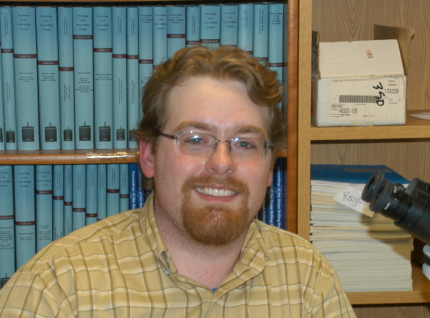
A UNL student has assisted the effort to curtail the Deepwater Horizon oil spill in the Gulf of Mexico.
For 11 days this summer, Matt Corbett (pictured) worked on the Development Driller III, one of the two ultra-deepwater drilling rigs creating relief wells for the largest offshore oil spill in U.S. history. Corbett landed on the rig through an internship with a Florida-based company, Bugware Inc.
"My role on the DD3 was basically to serve as a sample catcher," said Corbett, a doctoral candidate in Earth and Atmospheric Sciences. "As they are drilling, the bit carries rock and debris up to the surface. A sample catcher takes samples of the rock chips and mud so geologists can look at them to determine what types of rock the drill is going through and how deep it is.
"Those samples are used to determine how close they are to reaching the oil reservoirs."
Corbett will work as a Bugware intern until December. The company sends representatives to assist geologists on oil drilling rigs and studies rock/mud samples for other companies.
Corbett said microfossils in the rocks provide data that helps date samples, determine the formation from which they were collected and where oil may be found. The samples can also contribute to additional scientific study.
"Back at Nebraska we use these kinds of samples for paleoceanography research to help better understand climate change and evolutionary patterns," Corbett said. "Based on numbers and where they are found, these little critters in the rock can provide cues on what happened in the past.
"I find that kind of work, and what I did on DD3, very interesting."
At UNL, David Watkins, chair and professor of Earth and Atmospheric Sciences, advises Corbett. Watkins - who specializes in micropaleontology and marine geology - attracted Corbett to UNL.
"I finished my undergraduate work at Northeastern University in Boston and went to a conference for geologists looking to go on to grad school," said Corbett. "I bumped into Professor Watkins, we started talking and he sold me on UNL's program and professors. It's an amazing program that offers a lot of opportunity - including my internship with Bugware."
Corbett served on the DD3 from late June to July 5. He said workers on the platform were taking the drilling seriously with safety a primary concern.
"I couldn't even bring a camera on deck because of the threat of the flash igniting any gas that might be released," said Corbett. "Everyone out there is taking this work really seriously. They are working to get it done as quickly and as safe as possible.
"No one wants that old rig to keep leaking."
Corbett had planned to be on the rig for a few more days, but all nonessential personnel were evacuated because of threat of severe weather. Corbett was returning to his office in Tallahassee on July 6 and did not know if he would be back on the DD3 rig before the relief well is finished.
"It was surreal being out there in the middle of this whole mess," said Corbett. "You usually picture these rigs out in the middle of nowhere surrounded by nothing but ocean. But there I was walking around with buckets of rock, flares burning in the background with boats and other rigs all around.
"I'm at the bottom rung in this relief effort, but I was glad to get out there and do my little bit."
- By Troy Fedderson, University Communications